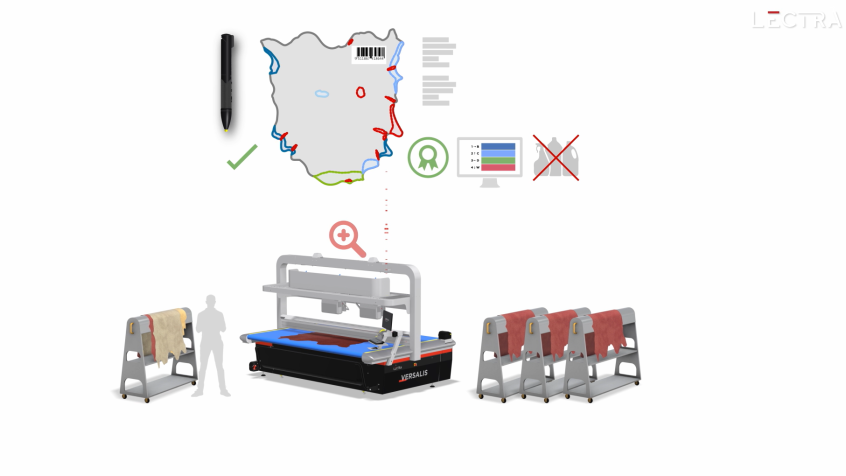Sustainability generates material cost savings for the automotive industry
Learn why automotive interior manufacturers are overcoming the challenges of small series and mass-customization by digitalizing their cutting rooms.

Material cost savings in automotive ?
Sustainability is proving to be a perfect decision-making framework for automotive manufacturers seeking growth and cost savings in today’s challenging economic environment. The recent uptick in corporate sustainability investments and the growing commitment by automotive manufacturers to the circular economy—a business model to maximize employee performance and minimize raw material input and waste generation–is proving that the trend for sustainability is more than marketing buzz.
In a recent report on sustainability efforts around the world, Bob Holycross, Vice President, Chief Sustainability, Environment and Safety Officer at Ford said, “We can develop and make great vehicles, sustain and grow a strong business and protect our planet at the same time – in fact, those ideals complement each other.”
Incidentally, Ford and most of the leading automotive manufacturers have all signed the Automotive Industry Guiding Principles to Enhance Sustainability Performance in the Supply Chain with many finding that their investments in sustainability are generating significant value for their business, society, and our environment.
Make smarter resource management decisions
Resource management is an important aspect of any organizations success, more so when competing in a contracting market shaped by the global COVID-19 crisis. If companies want to grow market share, reduce costs and expand into new markets it is vital to have the necessary capital, labor and raw material resources available in the proper quantities and at the right time.
The sustainability framework improves the decision-making process around resource management by empowering executives to think about the environmental impact of their actions to gain material savings, make best use of human capital and maximize financial performance.
The benefit of sustainability is that it permits automotive executives to meet the needs of their stakeholders without compromising their ability to meet the needs for future stakeholders. In short, executives are able to ensure their company’s longevity by making smarter decisions to manage resources more efficiently.
Build a strong partnership for success
When pursuing a sustainability agenda, companies will need to collaborate with a strategic technology partner to help them avoid key problems before they arise. Despite its reward for material cost savings, it is no easy task to maintain competitiveness and profitability while using fewer resources.
A technology partner that is exciting to work with brings new opportunities to the table. They know how to both meet the demands of sustainability—reducing waste, using fewer resources, and saving energy—as well, as how to solve the core business needs that allow automotive companies to remain competitive in their industry: increasing operational uptime, reducing costs and improving productivity.
To achieve success, business leaders need a trusted stakeholder that can accurately monitor material consumption and maximize material yield to help them use resources with greater efficiency; protect the safety of their operators to maximize human capital ROI; and reduce associated operational costs by providing an integrated equipment, software and service offer to optimize workflow processes for shorter production cycles.
In essence, a partner that provides the tools and support needed to identify and solve emergent and complex problems related to resource management and material cost savings. The key challenge when implementing a sustainability initiative is to overcome design and product development complexity so that executives can make smarter resource planning and cost estimating decisions.
Enhance business performance to get cost material savings
Achieving sustainability in collaboration with a trusted technology partner goes beyond simply being compliant with local environmental and labor laws or conforming to the expectations of international organizations; it puts automotive industry leaders back in the driver’s seat, giving them the power to direct and control their operations in a way that suits the trending challenges of their industry.
Automotive executives framing their management and strategic decisions around the environmental, economic, and social pillars of sustainability are improving the overall performance of their organizations; cultivating a more positive brand image and a reputation for trust; and ensuring future viability for their company and our planet.
It is super important to optimize for success by preparing for the future. Smarter resource management not only reduces waste and improves productivity, giving companies a short-term boost in profitability; it also strengthens long-term resiliency and the ability for future generations to meet their needs.
How sustainability generates material cost savings for the automotive industry by the numbers
- 14% decrease in waste generated per car produced over the last 10 years
- 20% reduction in energy for Daimler Chrysler to paint their cars
- 110kg of CO2 emissions per 1 square meter of leather (link to chart)
